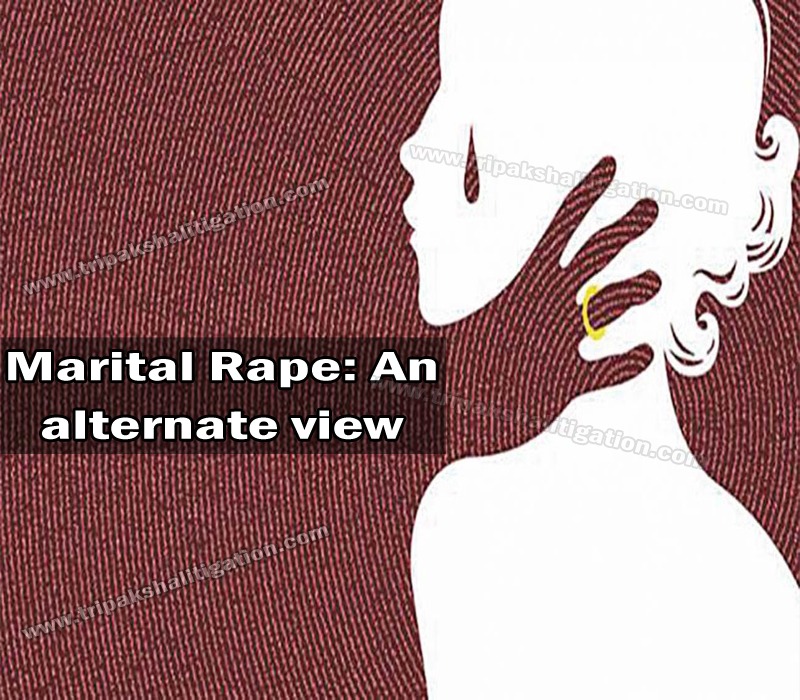Stereotypes and misunderstandings are common in discussions of marital rape, where males are associated with terms like power, strength they too could be a victim of Marital Rape…
INTRODUCTION:
Marriage is a sacred institution and touching it will leads to breakdown of marriages. They are of the view that India should be proud of its culture because `the nation has low divorce rates’.
The culture of `silence’, `tolerance’, `adjustment’, `compromise’ among marriage institution is propagated to `save and respect the `honor’, the `pride’ and the `values’ of the Indian family overlooking the fact that incest, violence, suicides, murders are the price that is believed that only a woman pays. On the other hand the law against domestic violence has been misused by women and therefore should be diluted. Any enactment of penal law against marital rape will also be abused by women, which is somewhere true as when it comes to rape it is not about gender anymore but all about power, position and dominance.
Criminalizing marital rape has been a long standing demand made by the women’s movement in India. Recommendations of penalizing rape within marriages were also made by the Justice Verma Committee Report formulated after Nirbhaya’s gang rape case.
The Criminal Law Amendment Act 2013 does not recognize marital rape as a crime unless a wife below 16 years of age is sexually assaulted or rape is committed during the period of separation between the spouses. The state took the stand that the Protection of Women against Domestic Violence 2005 already provide remedy besides the provisions under criminal law. Though recently, under the pressure from the men’s group, steps are being taken to dilute the already existent criminal law provision under the Section 498 A of the Indian Penal Code which penalize cruelty to married women. Nevertheless, this approach fails to see the fact that even such reform is required in the case of Marital Rape as the pragmatic approach suggests that a male suffers more humiliation by tag of impotency and other society criticism if one is able to muster the courage to speak against a lady to whom he is legally wedded.
Rape is a Rape let that be against a man or a woman, the psychological damages of after math of Rape cannot be segregated on basis of gender, as Article 21 does not differentiate the right to life on basis of Gender.
REFUSAL TO BELIVE MALE AS VICTIM:
Fact is that marital rape is an extreme form of sexual violence. It is a violation of the trust and sanctity in a relationship besides it also overlooks fundamental principle of one’s bodily integrity. This rationality fails to address the structural inequalities inherent in the system and indoctrinate the acceptability of sexual violence against a spouse as `normal’ and advocating women as only suffer or survivor of Marital Rape is only one side view of presenting this horrific crime.
The agony further raises its bar where one shows the concern as to the maximum of raising the crime as gender neutral but refutes the concern that a man can also be subjected to such heinous and can be even in more precarious condition because of the present social stigma and society criticism leading to mockery on raising the voice against his wife for a sexual ordeal to which he might not be physical and psychologically willing.
First line of thought, which is in direct contradiction with the first, opines that women can be misusing and abusing the dowry and the domestic violence laws, but where is comes to the commission of crime against the human body like that of a Rape where a woman is the culprit, the orthodox or the so called women activists makes sure that progress on such vital issue remains trivializing the judicial process.
Where the second is based on the presumption that majority of men and women are illiterate and poor trapped by their orthodox religious and social beliefs and are too ignorant to understand the intricacies of sexual violence within marriage. This point is in direct negation of the first line of thought which safely fails to assume that women in India are too smart to understand the complexity and technicalities of law, and are therefore frivolously misusing the laws to `implicate their family members in order to take revenge’.
MYTHS REGARDING MALE VICTIMS OF RAPE:
Man is not vulnerable
By masculine gender socialization, it is thought that males, even younger males, cannot be victims of rape, nor even that they are vulnerable. In some societies, it is considered shameful and unmanly if a male child cries, because the male stereotype depicts males as being able to protect themselves, which may not always be the case. An adult male may also be helpless to fight back, or fearful of doing so because of the possibility of being arrested for assault and/or battery due to social double standards regarding the use of force in self-defense between genders, in some cases of female perpetrators (this double standard is similar to the concern of male self-defense against non-sexual assault by a female).
Man always wants sex
A common societal belief is that a male must be aroused if he gets an erection or has an orgasm therefore that means that they are willing and enjoying any sexual activity.
As Roy J. Levin and Willy Van Berlo wrote in article for the Journal of Clinical Forensic Medicine that slight genital stimulation or stress can create erections “even though no specific sexual stimulation is present”. An erection does not mean that the men consent to sex. Males can get erections even in traumatic or painful sexual situations, and this does not indicate consent.
Much like female erectile response, male erectile response is involuntary meaning that a man need not be aroused for his penis to become erect; mechanical stimulation is all that is necessary. Arousal and stimulation are distinct things. Stimulation is a physical response to a stimulus. Men can be physically stimulated without feeling aroused and thus causing an erection. Men can be scared and intimidated into an erection, especially if the person is older or an authority which means domination as well.
Traumatization
One notion is that males are less traumatized by the abuse experience than females are; this includes the belief that males are less negatively affected. Studies show that the long-term effects are damaging for either sex and males may especially be more damaged by social stigma and disbelief of their victimization. It is noted by Eagan and Richardson that male victims tend to feel more intense anger than female victims, while both go through similar feelings of distress after the rape.
Frazier (1993) studied 74 male and 1,380 female rape victims where she found that the depression and hostility are more profound on male victims immediately post-rape than on female victims.
EFFECTS OF MARITAL RAPE ON MEN:
Physical effects
Sexual abuse results in severe emotional and often physical trauma. The symptoms and injuries most frequently noted are tension headaches, ulcers, nausea, colitis, abrasions to the throat, black eyes and broken bones.
The data from hospital emergency rooms show that male rape victims are more likely to have non-genital injuries than females and that they are more likely to neglect seeking medical attention if the injuries are not significant.
Psychological effects
Rape victims, males and females, may find it difficult to report the sexual assault against them. This is very damaging to victims, both to their mental states and to how people treat them in case of disclosure of their ordeal. Elizabeth Donovan, a psychotherapist, stated that males have the added burden of facing a society that does not believe that rape can happen to them at all.
Since most studies have found that people tend to blame the victim man of Marital Rape for the incident often with humiliating tags like impotent, a study called Gender Differences in Attributions of Blame for Male Rape Victims in the Journal of Interpersonal Violence focused on where the blame lies in rape cases. In cases of female rape victims, a higher proportion of males than females tend to blame the victim for the sexual assault. This study implies that even in cases of male sexual victimization, the male victims are held responsible for the assault by the majority of the uninvolved population.
Long-term effects
- Pressure to prove his manhood physically and sexually (becoming stronger and engaging in dangerous or violent behavior; having multiple female sexual partners).
- Confusion over gender and sexual identity.
- Sense of being an inadequate man.
- Sense of lost power, control, and confidence to his manhood.
- Problems with closeness and intimacy.
- Sexual problems.
- Suicide possibility
CONCLUSION, A POSSIBLE SOLUTION:
The rape of males in India is commonly underreported. For this reason, some activists and research organizations, including Jai Vipra at the New Delhi think-tank Centre for Civil Society, argue that the phrasing of rape laws should be gender-neutral. This view is very important as there are many who still believes that a man cannot be raped and especially by his wife.
The Indian Penal Code, Section 377, is the only section that criminalizes all acts of nonconsensual carnal intercourse, including male-on-male rape but remains silent on the issue where the perpetrator is a woman.
The rape definition in Section 375 of Indian Penal Code does not include rape in which males are the victims. The Indian government (2012) decided to change the definition of “rape” as forcible penetration to include male victims, but was criticized on the grounds that this would further harm the interests of female rape victims.
In the 2013 Criminal Law (Amendment) Ordinance, rape and sexual harassment crimes were gender neutral. The term “rape” was removed and substituted with “sexual assault”. But strong objections were raised by feminist groups that made the Indian government decided to restore the term “rape” and state that only men can be the rapists of women.
The only possibility that can arises to defend man in this condition of plight is by removing the colored spectacles of view that only men can rape, the general notion of rape from use of manhood is outdated even as per the penal code definition, now a broader picture for the definition should surface that the concept of rape is not gender biased but actually is a stigma of use of power, authority and dominance, which might emanates from the law or by social pressure.
You may contact me for consultation or advice by visiting Contact Us









Thanks for your article. Keep doing it until all the man can get aware about male victims.